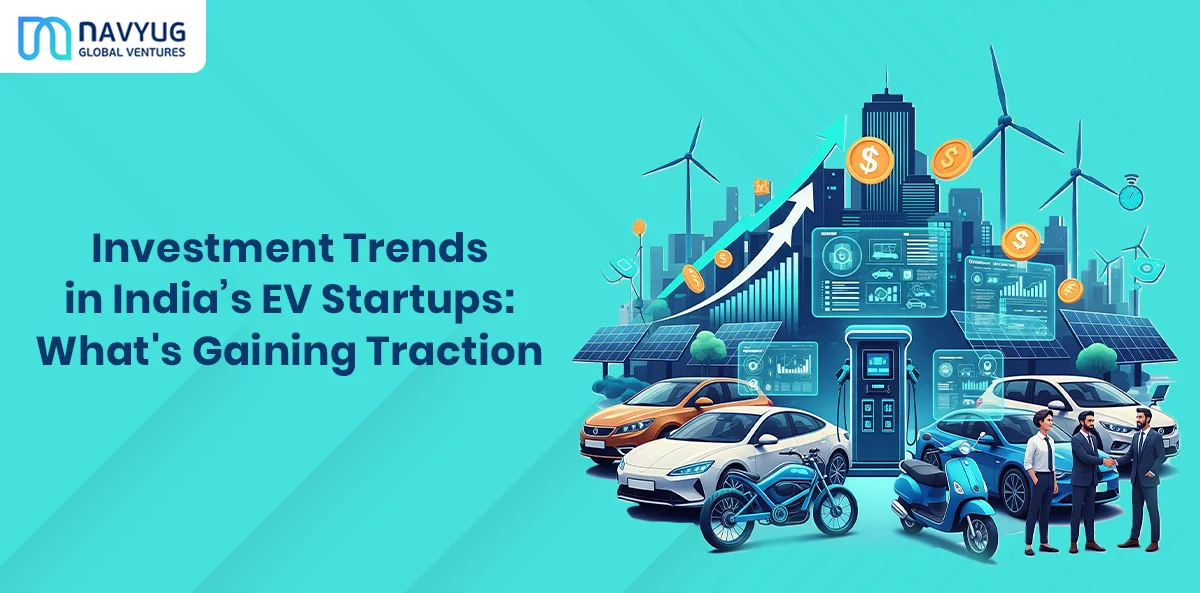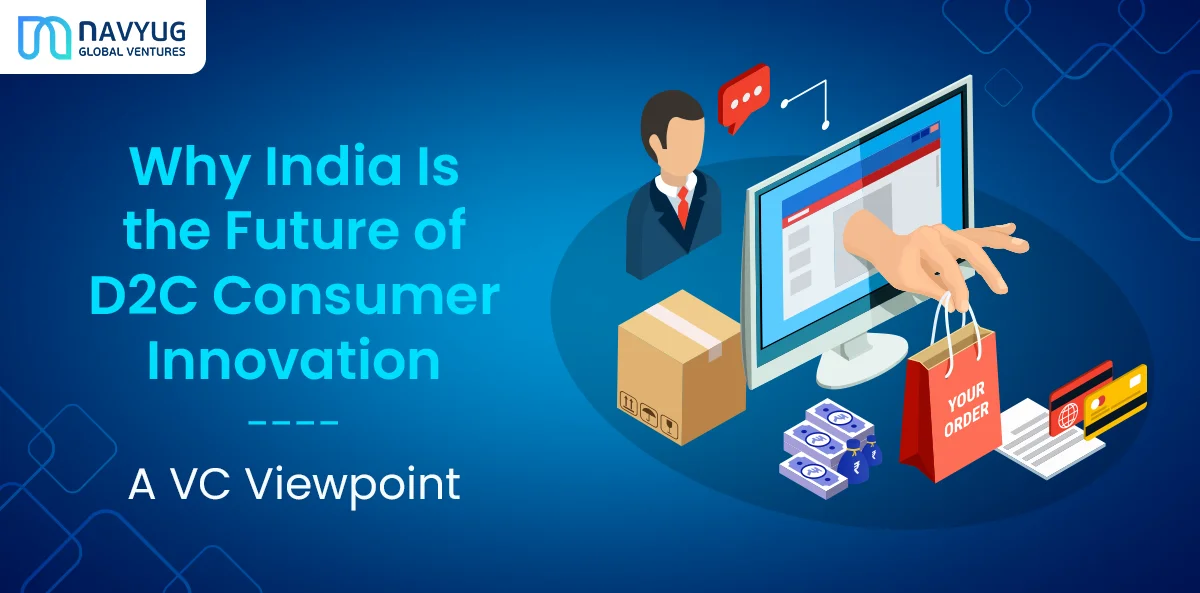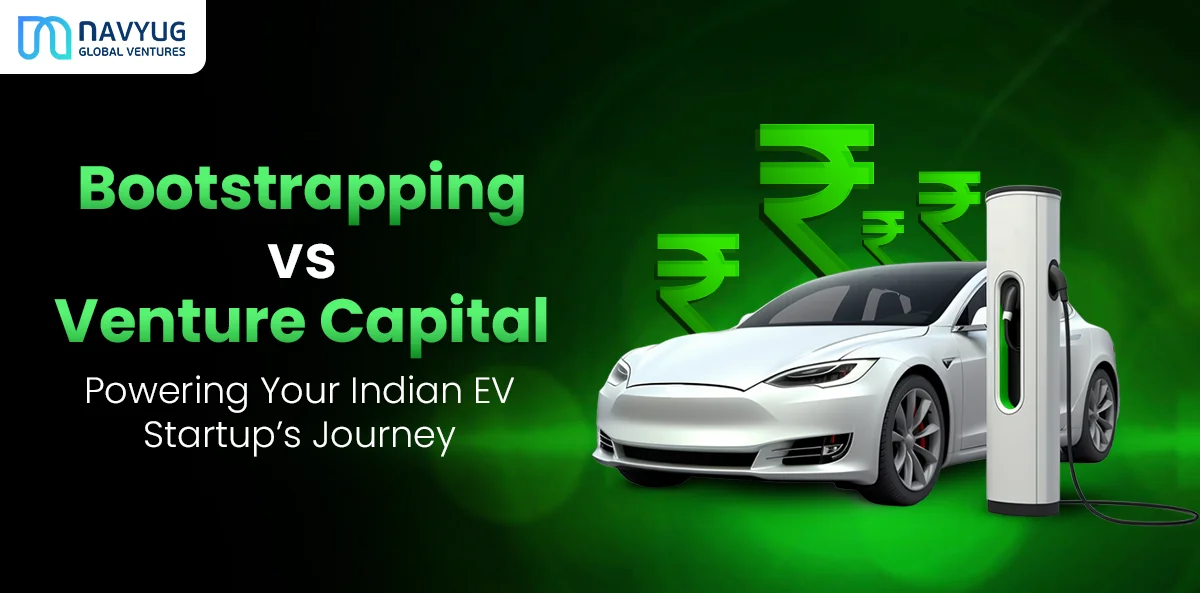The Indian transportation landscape is undergoing a monumental shift. A powerful combination of government policy, growing environmental awareness, and breakthroughs in technology is fueling an electric vehicle revolution. The goal is clear and ambitious: by 2030, the government aims for electric vehicles to make up 30% of private cars, 70% of commercial vehicles, and a staggering 80% of two and three wheelers. This could translate to approximately 80 million EVs on our roads in less than a decade. (Source)
For a venture capital firm in India like Navyug Global, this isn’t just an environmental movement; it’s one of the most significant investment opportunities of our generation. The market is buzzing with activity, with EV startup investments in India reaching new heights. But beyond the headlines, where are the most strategic opportunities? This article unpacks the key India EV funding trends to show what’s truly gaining traction in the ecosystem.
Surging Growth: A Look at India EV Funding Trends and Market Size
The momentum behind India’s electric vehicle sector is undeniable. The total electric vehicle sales across all segments in India have charged past the 1.5 million-unit mark in calendar year 2023. At an estimated 1,529,945 units, YoY growth is a staggering 50% (CY2022: 1,024,808 EVs).(source). While these numbers are impressive, they are just the beginning.
The long-term outlook is even more compelling. According to a recent report from Mordor Intelligence, the Indian EV market is projected to skyrocket to ₹9.24 lakh crore (US$ 110.74 billion) by 2029, expanding at a remarkable compound annual growth rate (CAGR) of over 30%. This explosive growth is fundamentally powered by a shift in consumer mindset, with multiple surveys indicating that a significant majority of potential car buyers in India now seriously consider an electric vehicle for their next purchase.
This powerful combination of proven sales momentum and massive future potential creates a fertile ground for EV startup funding, signaling a golden era for innovative electric vehicle startups.
Where Venture Capital in EV Sector is Flowing: Hotspots for Mobility Startups India
While the finished vehicle is the most visible part of the revolution, savvy venture capital funds are looking deeper into the ecosystem. The most promising mobility startups India has to offer are those solving critical challenges that enable mass adoption. Here’s what’s getting the most attention.
- Two and Three Wheeler Electrification
The core of India’s mobility is its fleet of two and three wheelers, and this is where electrification is happening the fastest. Startups in this segment are attracting significant capital. Take Ather Energy, a leading electric scooter maker backed by major investors, or Yulu, a bike sharing service that recently raised US$ 19.25 million from backers like Bajaj Auto (source). The success of these electric vehicle startups shows the immense potential in providing affordable, efficient, and smart urban mobility solutions. With a government target of 80% electrification in this segment, the runway for growth is enormous. - Charging Infrastructure and Battery Swapping
An EV is useless without a reliable way to power it. This simple fact has made charging infrastructure a hotspot for EV startup investments in India. While the country has over 12,000 public charging stations (source), a recent CII report highlights the need for at least 1.32 million stations by 2030 (Source). This gap represents a massive opportunity.
Startups like ElectricPe and Battery Smart are leading the charge. Battery Smart, a battery swapping network, recently raised $65 million in a Series B round with participation from firms like Orios Venture Partners (source).This model is particularly attractive for commercial use, where downtime is costly. Large corporations are also stepping in, with Indian Oil Corporation launching battery swapping stations and Hyundai expanding its ultra fast charging network across major cities.
- Commercial Electric Vehicles
For logistics and fleet operators, the economic argument for going electric is undeniable. Lower fuel and maintenance costs translate directly to a better bottom line. This has made electric commercial vehicles a prime target for venture capital in EV sector. Euler Motors, which specializes in this space, has consistently attracted significant capital, including a recent funding round of ₹200 crore (approx. $24 million) to fuel its growth (Source). The focus here is on creating reliable, high capacity vehicles that can form the backbone of modern logistics. - The EV Component and Battery Ecosystem
India’s ambition for complete domestic EV production under the ‘Make in India’ initiative is fueling massive investment in the component supply chain. The Indian EV battery market alone is projected to grow to US$ 27.70 billion by 2028 (source). The government is backing this with Production Linked Incentive (PLI) schemes for advanced chemistry cell (ACC) battery storage.
We are seeing this play out in real time. In April 2024, auto components giant Uno Minda partnered with a Chinese firm to produce EV parts locally (source). Established players like Exide Industries are investing hundreds of crores to boost their lithium ion battery cell plants. This push to localize manufacturing is creating a wealth of opportunities for deep tech EV startups working on battery management systems, advanced battery chemistries, and other critical components.
Recent Corporate Moves & EV Startup Investments in India
The last year has been marked by a series of high profile announcements that underscore the sector’s vitality.
- Major Automakers: Tata Motors has committed approximately Rs. 18,000 crore to build out its EV ecosystem (source). Vietnamese automaker VinFast signed an MoU with the Tamil Nadu government for a US$ 2 billion EV project (source).
- Startup Success: Ola Electric, a dominant player in the two wheeler market, became India’s top patent publisher in the EV space and announced its entry into the electric autorickshaw segment. (sources 1 & 2)
- Strategic Partnerships: The JSW Group formed a strategic joint venture with SAIC Motor to focus on green mobility, while Macquarie Group launched ‘Vertelo,’ an EV financing and fleet management platform (source).
This constant flow of capital and strategic activity is a clear indicator of the market’s long term potential and a positive sign for the future of EV startup funding.
What Venture Capital Firms Are Looking For in EV Startup Funding
Attracting capital in this competitive space requires more than a good idea. Venture capital funds are meticulous in their evaluation, focusing on businesses built for long term success. Here are three critical areas that every founder must address:
- Scalable Technology and a Defensible Moat: A working prototype is just the beginning. Investors want to see technology that can be manufactured efficiently and reliably at a massive scale. What is your proprietary intellectual property? Is it a unique battery chemistry, an intelligent Battery Management System, or a groundbreaking motor design? Your technology must create a defensible moat that protects you from competitors and allows you to build a lasting market leadership position.
- Positive Unit Economics: Growth at any cost is no longer a celebrated strategy. A core focus for any venture capital firm in India is a startup’s path to profitability. You must demonstrate a clear understanding of your unit economics. For every scooter sold, battery swapped, or charging session completed, is there a clear path to making a profit on that single transaction? A business model that shows how you will achieve and scale positive unit economics is a powerful signal of a sustainable and well managed company.
- Deep Regulatory Awareness: The Indian EV market is uniquely shaped by government initiatives like FAME and PLI schemes. A founding team that demonstrates a deep understanding of this regulatory landscape has a significant advantage. Can you articulate how these policies benefit your business model? Are you prepared for potential changes? This awareness shows investors that you are not just building a product, but a resilient business that can navigate and leverage the specific conditions of the Indian market.
How Navyug Global is Powering EV Startups
Our commitment to the EV revolution is driven by a clear investment thesis. We believe the real, sustainable value in India’s electric mobility story is being built in the foundational layers of the ecosystem. While new vehicle launches capture attention, we are actively seeking out the companies building the critical infrastructure, components, and software that will power millions of vehicles.
We partner with EV startups that are capital efficient, tech first, and led by exceptional founders. For example, we look for companies developing advanced telematics for commercial fleets, creating innovative financing platforms for EV buyers, or pioneering new materials for battery manufacturing. These are the businesses that form the backbone of the entire industry. They are not just participating in the trend; they are building the platforms upon which the future of mobility will stand.
We are looking for the next generation of pioneers in the electric mobility space. If you are a founder with a bold vision and a business that is ready to scale, we want to hear from you.
Conclusion: The Bright Road Ahead for Electric Vehicle Startups in India
The investment trends in India’s electric vehicle sector point toward a bright and sustainable future. The momentum is undeniable, driven by strong government support, massive market demand, and a vibrant ecosystem of innovators. The focus has clearly shifted from simply building vehicles to creating an entire support system, from localized battery production and component manufacturing to widespread charging networks.
India’s mobility industry is on track to exceed Rs. 51,92,400 crore (US$ 600 billion) by 2030 (source). The opportunities for founders and investors are immense. As stakeholders continue to channel capital into manufacturing, technology, and integrated solutions, India is accelerating its journey toward a cleaner transportation system.




